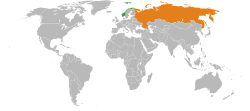Top Qs
Timeline
Chat
Perspective
Norway–Russia relations
Bilateral relations From Wikipedia, the free encyclopedia
Remove ads
Norway–Russia relations are the bilateral relations between the Kingdom of Norway and the Russian Federation. Diplomatic relations between the two nations were established on 30 October 1905 – four days after the establishment of Norway's independence.[1] Russia has an embassy in Oslo, as well as consulates in Barentsburg and Kirkenes; likewise, Norway has an embassy in Moscow, as well as consulates in Murmansk and Saint Petersburg. The countries border each other along a 195.7 km (121.6 mi) long border. Norway is on Russia's Unfriendly Countries List.

Remove ads
Timeline
Summarize
Perspective
1537–1814
Denmark handled the foreign relations of Norway during this period. Denmark and Russia were in general allies against their mutual enemy Sweden.
1814–1905
Sweden handled the foreign relations of Norway during this period. The Norway–Russia border was defined in 1826.
1917–1991
After 1991
On 27 April 2010, Norway and Russia officially resolved the territorial dispute in the Barents Sea.[2]
In May 2012, Akhmed Zakayev, Prime Minister of the Ichkerian government-in-exile, attended the Oslo Freedom Forum, leading to formal complaints by Russia.[3]
In July 2020, Norway expelled a Russian diplomat on suspicion of espionage.[4]
After Russia invaded Ukraine in February 2022, Norway imposed sanctions on Russia.[5] Later on 6 April 2022, Norway declared three Russian diplomats persona non grata, and expelled them from the country.[6] Russia expelled three Norwegian diplomats later that month.[7] Except for fishing boats who may still dock in Båtsfjord, Kirkenes and Tromsø, all Russian ships were also banned by Norway from entering Norwegian ports.[8] The border between the two countries remains open, but crossing is only allowed via Borisoglebsk/Storskog.[9]
In October 2022, the Norwegian Police Security Service arrested Mikhail Mikushin, a Russian national posing as a Brazilian with the name of José Assis Giammaria, and charged him with gathering intelligence on state secrets on behalf of Russia.[10] Mikushin was exchanged back to Russia during a prisoner exchange in August 2024.[11]
In April 2023 Norway expelled 15 Russian diplomats on suspicion of spying.[12] Russia promptly responded by expelling 10 Norwegian diplomats and in August added Norway to its list of unfriendly countries.[13]
Remove ads
Strains in bilateral relations
Summarize
Perspective
The environmentally harmful emissions from the Norilsk Nickel plant outside Nikel in the Murmansk Oblast[14] have been for decades an unresolved issue in then Norwegian–Soviet, and now Norwegian–Russian relations.
Formerly there was a territorial dispute over the Barents Sea, but on 27 April 2010, Norway and Russia officially resolved the territorial debate.[15]
A 2017 Kremlin maritime threat assessment which was sent to President Vladimir Putin highlighted Norway as a perceived threat and therefore a potential cause of naval conflict.[16]
In December 2017, Frode Berg, a Norwegian citizen, was arrested in Russia on allegations of having operated a spy ring in the country since 2015, and was detained at Lefortovo Prison.[17] In 2017, hackers believed to be Russians targeted the Labour Party.[17]
There has long been tension over the GLOBUS radar installation in Vardø, which Russian officials believe to be part of a United States missile defense system. Two mock airstrikes involving Russian fighter jets and bombers were executed against the town in 2017 and 2018, each time pulling short of violating Norwegian airspace, and in 2019 a Bal coastal missile system was deployed 70 km from the radar system, just 35 km from the Norwegian-Russian land border.[18][19][20][21]
Norway is strongly against the Russian invasion of Ukraine, and is among the leading countries in terms of military, humanitary and economic support to Ukraine.[22] Norway has instigated a long series of economic sanctions against Russia, including adhering to most of the sanctions from the European Union against Russia.[23]
Remove ads
In popular culture
The 2015 fictional political thriller TV series Occupied is based on a hypothetical strain in relations between the two countries after Norway ceases fossil fuel production in response to a climate crisis. It is available on Netflix in many countries.
In response to the TV series, the Vyacheslav Pavlovsky, the Russian ambassador to Norway, told Russian News Agency TASS,
It is certainly a shame that, in the year of the 70th anniversary of the victory in World War II, the authors have seemingly forgotten the Soviet Army's heroic contribution to the liberation of northern Norway from Nazi occupiers, decided, in the worst traditions of the Cold War, to scare Norwegian spectators with the nonexistent threat from the east.[24][25]
The Russian embassy had been informed in an early stage of the work on the series.[26]
Gallery
- Norwegian embassy in Moscow, Russia
- Russian embassy in Oslo, Norway
- Russian consulate-general in Kirkenes, Norway
- Russian consulate-general in Barentsburg, Norway
- Russian President Vladimir Putin with Norwegian Prime Minister Jens Stoltenberg in New York City, 2000
- Dmitry Medvedev speak at a joint press conference with Norwegian Prime Minister Jens Stoltenberg
- Dmitry Medvedev and Jens Stoltenberg with Ingrid Schulerud, Svetlana Medvedeva, Harald V of Norway, Queen Sonja of Norway and Haakon, Crown Prince of Norway outside Akershus Fortress in Oslo, Norway
Remove ads
See also
Notes
Literature
External links
Wikiwand - on
Seamless Wikipedia browsing. On steroids.
Remove ads









